The Therapeutic Potential of Cannabis in Breast Cancer Treatment
The Therapeutic Potential of Cannabis in Breast Cancer Treatment
By: Francis Appiah, Doctor of Naturopathic Medicine (N.D. Candidate), Medical Journalist, & Medical Laboratory Technologist
Email: kofiappiah803@gmail.com

In Ghana, where traditional medicine complements modern healthcare, an increasing number of women are exploring alternative treatments, including cannabis, for breast cancer symptom management. Globally, breast cancer affects millions, with the American Cancer Society estimating over 280,000 new invasive breast cancer cases in the US in 2023. This disease, characterized by uncontrolled breast tissue cell growth, poses significant challenges for patients and healthcare providers. Current treatments, such as surgery, chemotherapy, radiation, and hormone therapy, often have limitations like side effects, toxicity, and resistance. Recent studies demonstrate cannabis's therapeutic potential in alleviating breast cancer treatment symptoms, sparking interest in its potential to improve patient outcomes. Examining current cannabis research and applications in breast cancer care can deepen our understanding of its role in enhancing patient quality of life.
Breast Cancer Overview
Breast cancer is a complex and multifaceted disease characterized by the uncontrolled growth of abnormal breast cells, forming tumors that can spread throughout the body if left unchecked. As one of the most common cancers affecting women worldwide, breast cancer accounted for approximately 670,000 deaths in 2022, highlighting the need for continued research and awareness. About half of all breast cancers occur in women with no specific risk factors other than sex and age.
Breast cancer can be classified into several subtypes, each with distinct characteristics. Invasive ductal carcinoma (IDC) is the most common type, starting in the milk ducts and spreading to nearby breast tissue. Lobular breast cancer begins in the milk-producing glands (lobules), while ductal carcinoma in situ (DCIS) is a non-invasive cancer confined to the milk ducts. Other aggressive subtypes include triple-negative breast cancer (TNBC) and inflammatory breast cancer (IBC).
The exact causes of breast cancer remain unknown, but several risk factors have been identified. These include being 55 or older, female gender, family history, genetic mutations (such as BRCA1, Breast cancer gene 1 and BRCA2, Breast cancer gene 2), smoking, obesity, and radiation exposure. Notably, many cases occur in individuals without known risk factors.
Symptoms of breast cancer vary, but common signs include a lump or thickening in the breast or underarm area, changes in breast shape or size, skin dimpling or redness, and abnormal nipple discharge. Early detection through regular mammograms and self-exams is crucial for effective management and treatment.
CBD Oil in Breast Cancer Treatment
Cannabidiol, CBD oil, a non-psychoactive compound found in cannabis, shows promise in breast cancer treatment by interacting with the endocannabinoid system, specifically CB1 and CB2 receptors. This interaction helps manage cancer symptoms like pain, anxiety, insomnia, nausea, and vomiting. Research demonstrates CBD's ability to modulate signal transduction pathways regulating cell proliferation, differentiation, senescence, and cell death, supporting its potential as an anticancer agent (Velasco et al., 2012; Hinz & Ramer, 2019).
Studies confirm CBD's capacity to inhibit breast cancer cell growth and induce apoptosis (programmed cell death) (Ligresti et al., 2006). CBD also counteracts some THC psychoactive effects, such as anxiety, due to its low CB receptor affinity. In triple-negative breast cancer, CBD has shown potential in preclinical studies by inhibiting tumor growth and promoting apoptosis, with its anti-inflammatory and antioxidative effects contributing to therapeutic potential (Elbaz et al., 2015).
THC Oil in Breast Cancer Treatment
Tetrahydrocannabinol (THC) oil, a primary psychoactive compound in cannabis, shows potential in breast cancer treatment. THC interacts with Cannabinoid Receptor 1 (CB1) to induce cancer cell apoptosis and inhibit the Phosphatidylinositol 3-kinase (PI3K)-Protein Kinase B (AKT) and Rat Sarcoma-Mitogen-Activated Protein Kinase (RAS-MAPK) cascades, including BCL2-Associated Death Promoter (BAD) activation. A study by Caffarel et al. (2010) demonstrated a dose-dependent reduction in breast cancer cell survival when exposed to THC.
Research highlights cannabinoids' antitumor activity in preclinical studies, particularly in Triple-Negative Breast Cancer (TNBC) (Moreno et al., 2021). The Endocannabinoid System, comprising Cannabinoid Receptors 1 and 2 (CB1R and CB2R), regulates immune responses and may enhance cancer treatment. CB1R is highly expressed in the brain, while CB2R is predominantly found in immune cells, influencing cannabinoids' suppressive effects.
Activation of CB2R has been linked to immunosuppression, inhibiting inflammatory mediators and cytokines like Tumor Necrosis Factor-alpha (TNFα) and Interleukin-1 (IL-1) (Moreno et al., 2021). This immunosuppressive effect may contribute to cannabinoids' therapeutic potential in breast cancer treatment. In TNBC, cannabinoids may modulate the tumor microenvironment, impacting tumor growth, metastasis, and treatment response, and potentially enhancing immunotherapy efficacy.
RSO in Breast Cancer Treatment
Rick Simpson Oil (RSO), a cannabis extract rich in THC, interacts with the endocannabinoid system to potentially manage breast cancer symptoms. Research by Moreno et al. (2021) shows cannabinoids exhibit antitumor activity in preclinical studies, particularly in triple-negative breast cancer (TNBC) models.
RSO's high THC content may alleviate chemotherapy-induced nausea and vomiting, as cannabinoids have been shown to reduce these symptoms in patients (Smith et al., 2015). THC also improves taste, smell, appetite, caloric intake, and quality of life for cancer patients (Brassesco et al., 2011).
The endocannabinoid system's connection to the immune system and immunosuppression suggests cannabinoid receptors could serve as biomarkers for immune checkpoint inhibitor therapy or a means to reverse immunotherapy resistance (Moreno et al., 2021).
Case Study of Ghanaian Woman's Remarkable Recovery from Breast Cancer Using RSO Cannabis Extract
A case reported by HAG News suggests that a Ghanaian woman with breast cancer experienced remarkable recovery after using RSO cannabis extract. According to Nana Kwaku Agyemang, President of the Hempire Association of Ghana and CEO of Hempire Agric Ghana Ltd, the patient had undergone chemotherapy and radiation at the Hospital. Subsequently, she was given RSO cannabis extract, originally sourced from India, by the Hempire Association of Ghana to be taken alongside her chemotherapy and radiation treatment. The patient reportedly experienced complete remission of breast cancer after a few months. I have included pictures of the patient's condition before and after treatment for visual evidence of her remarkable recovery.
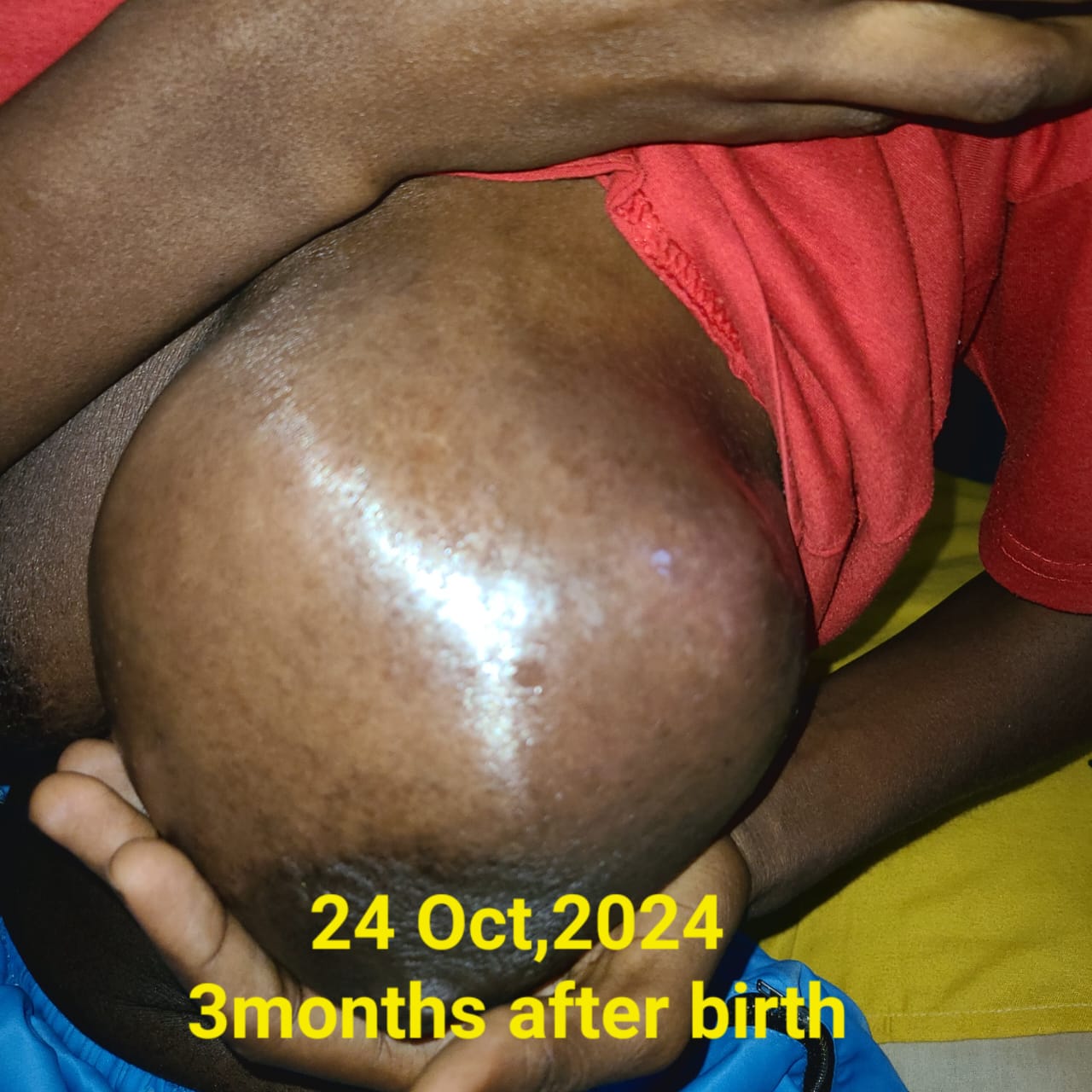
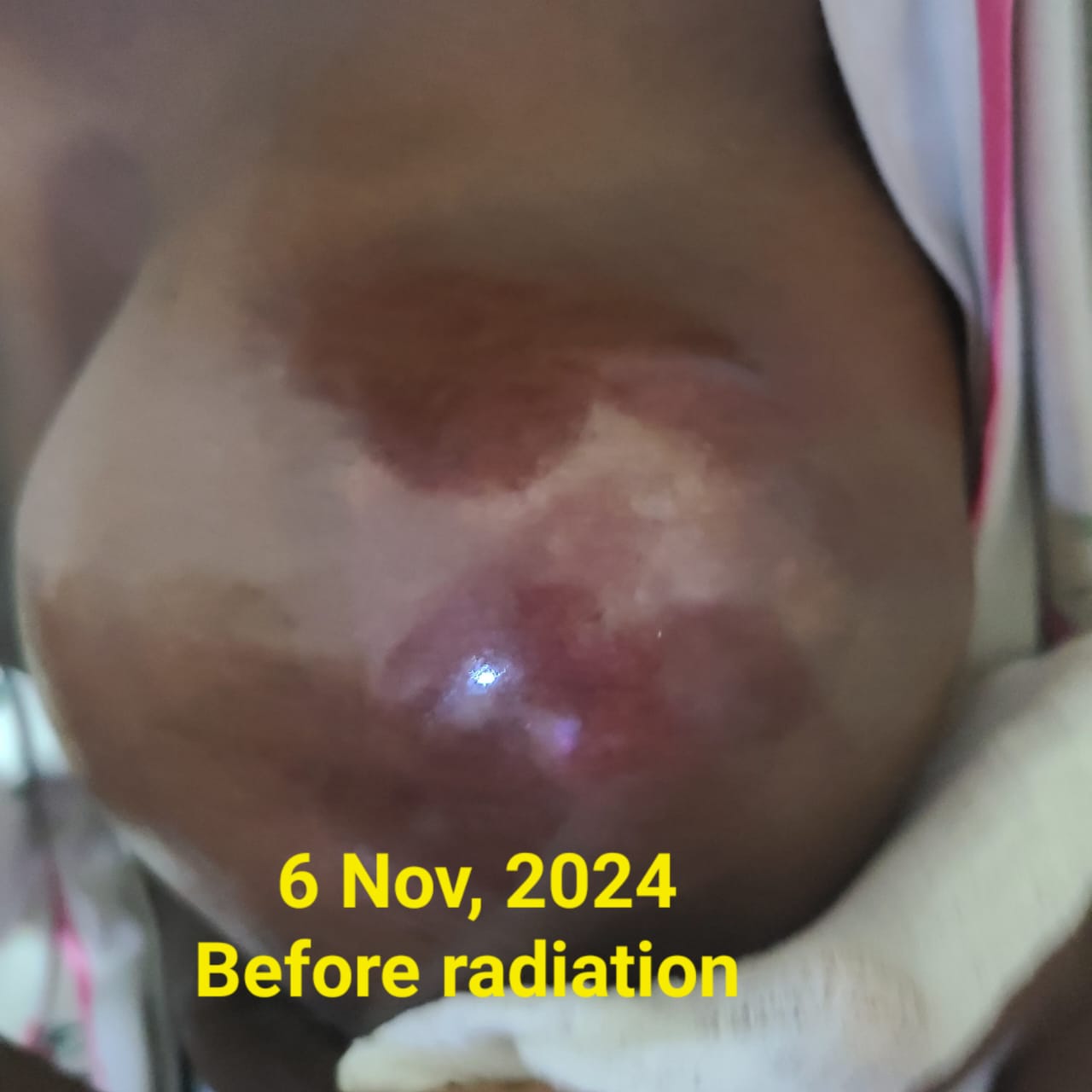
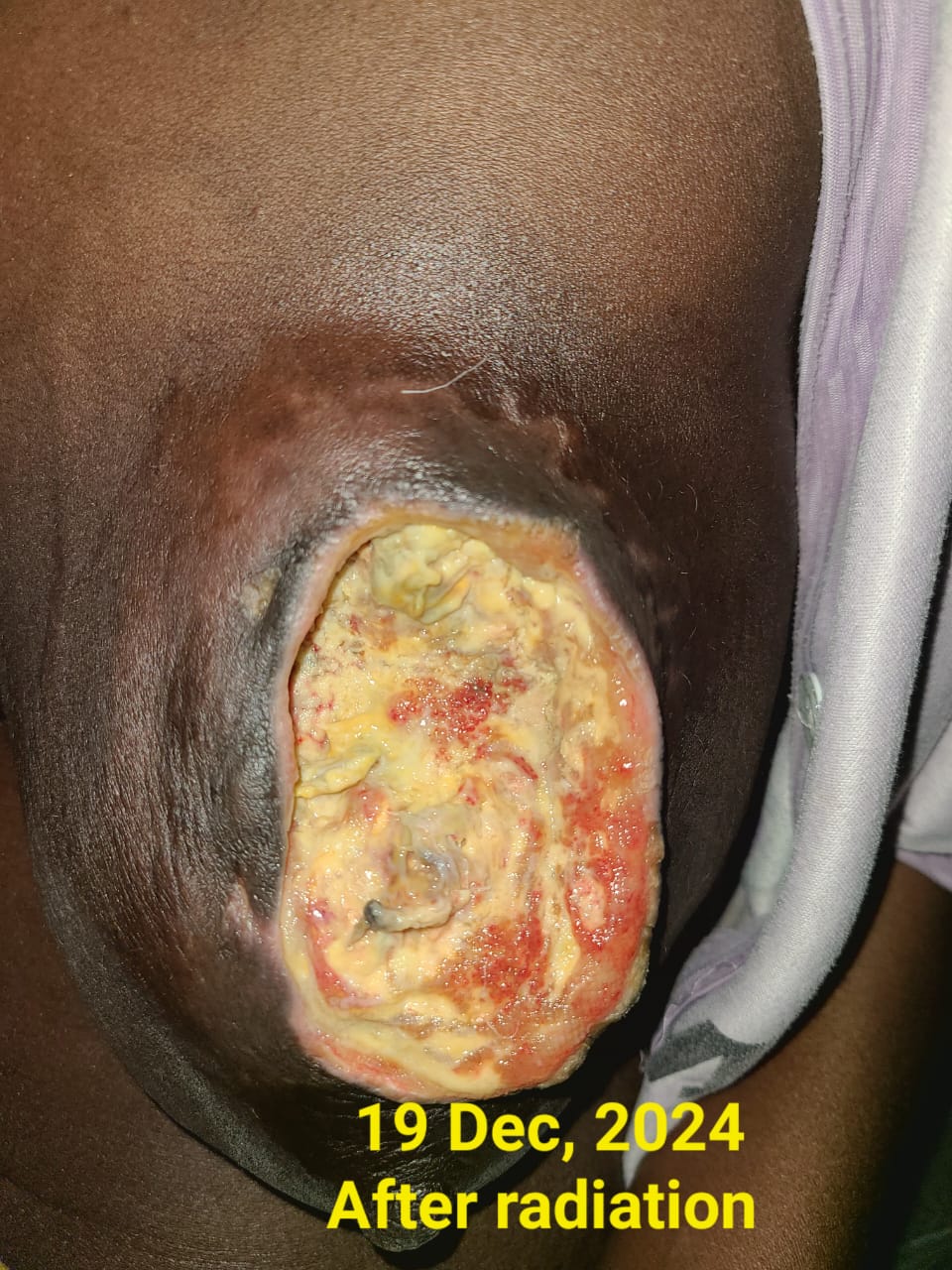
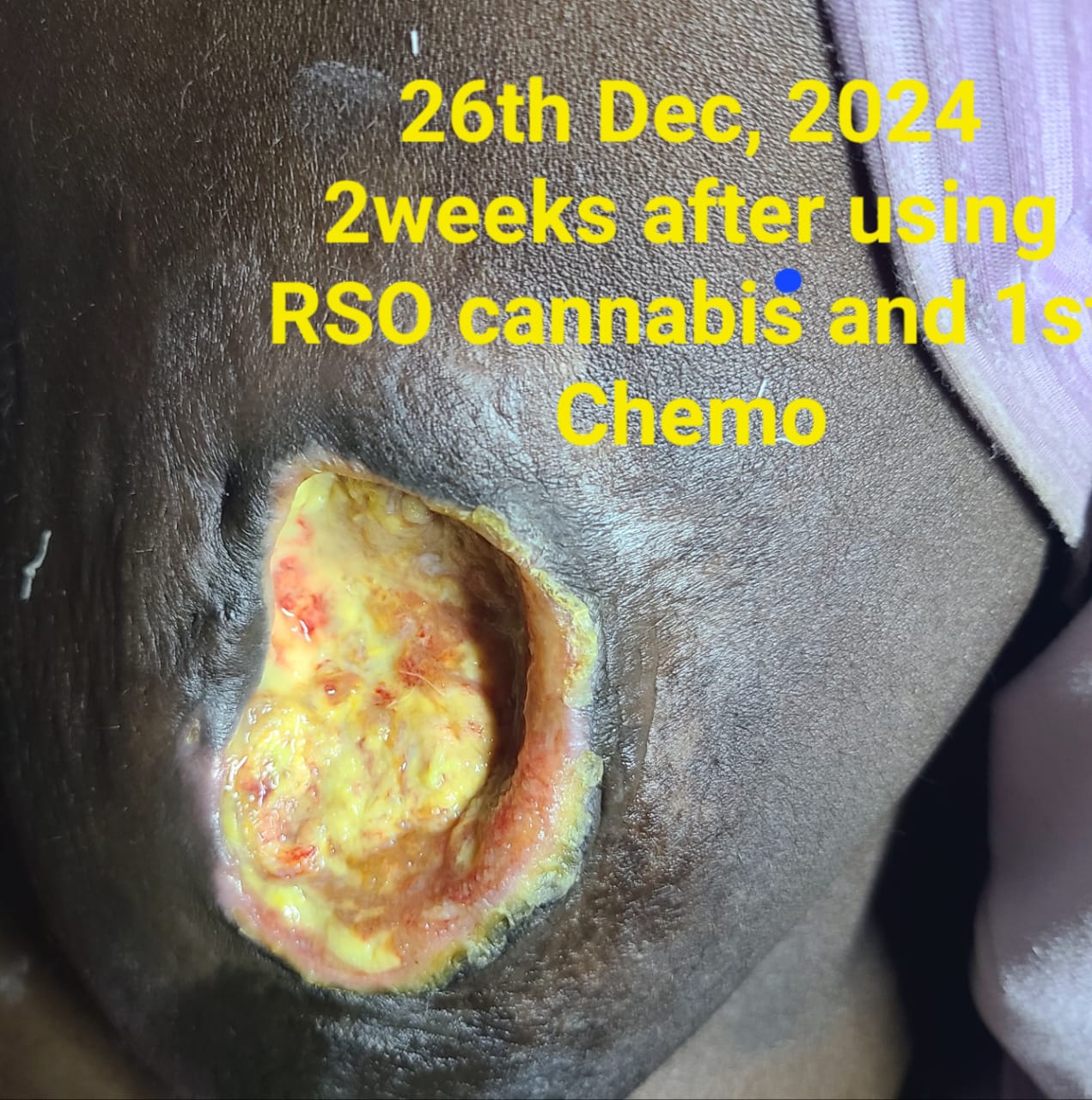
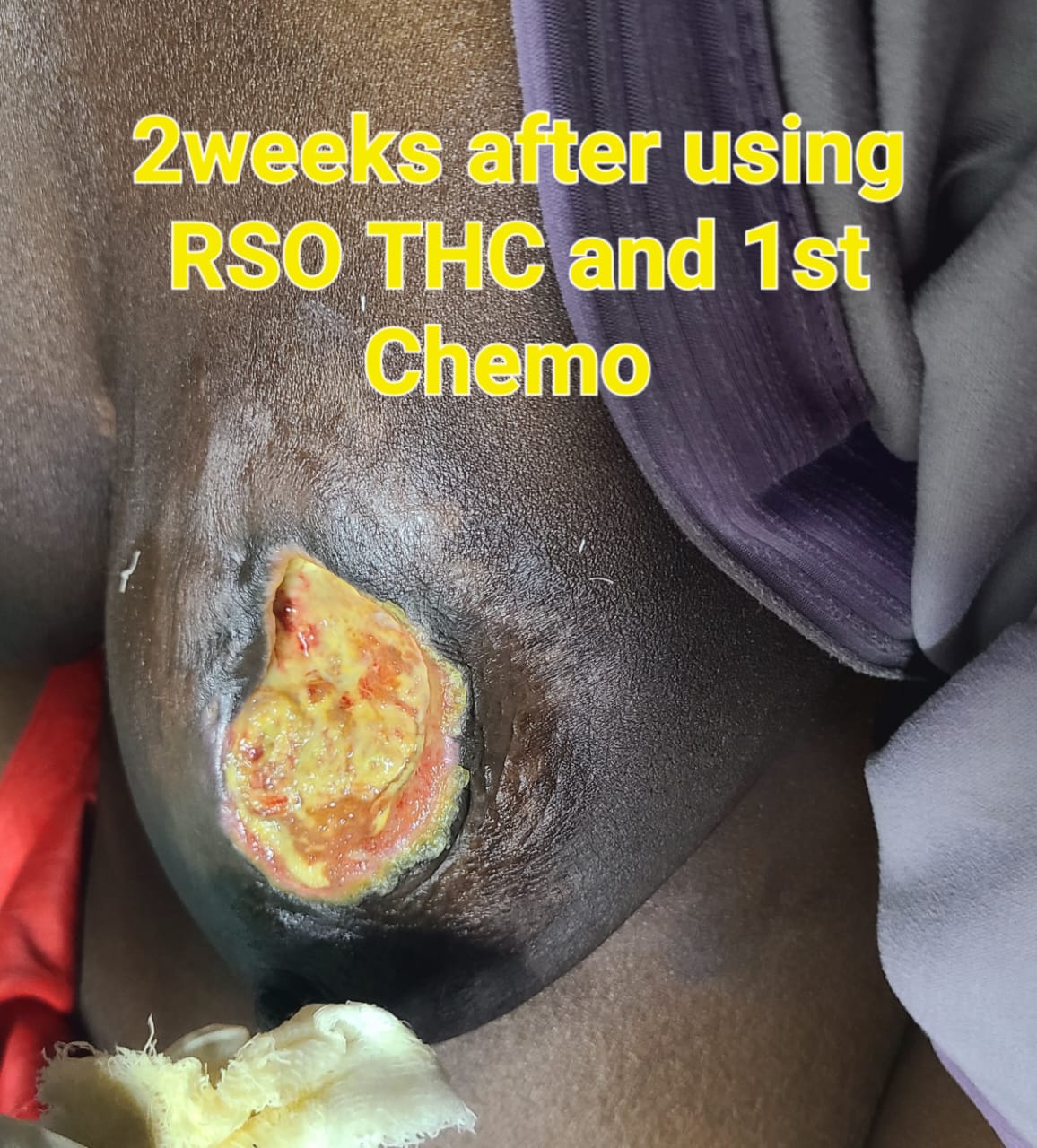
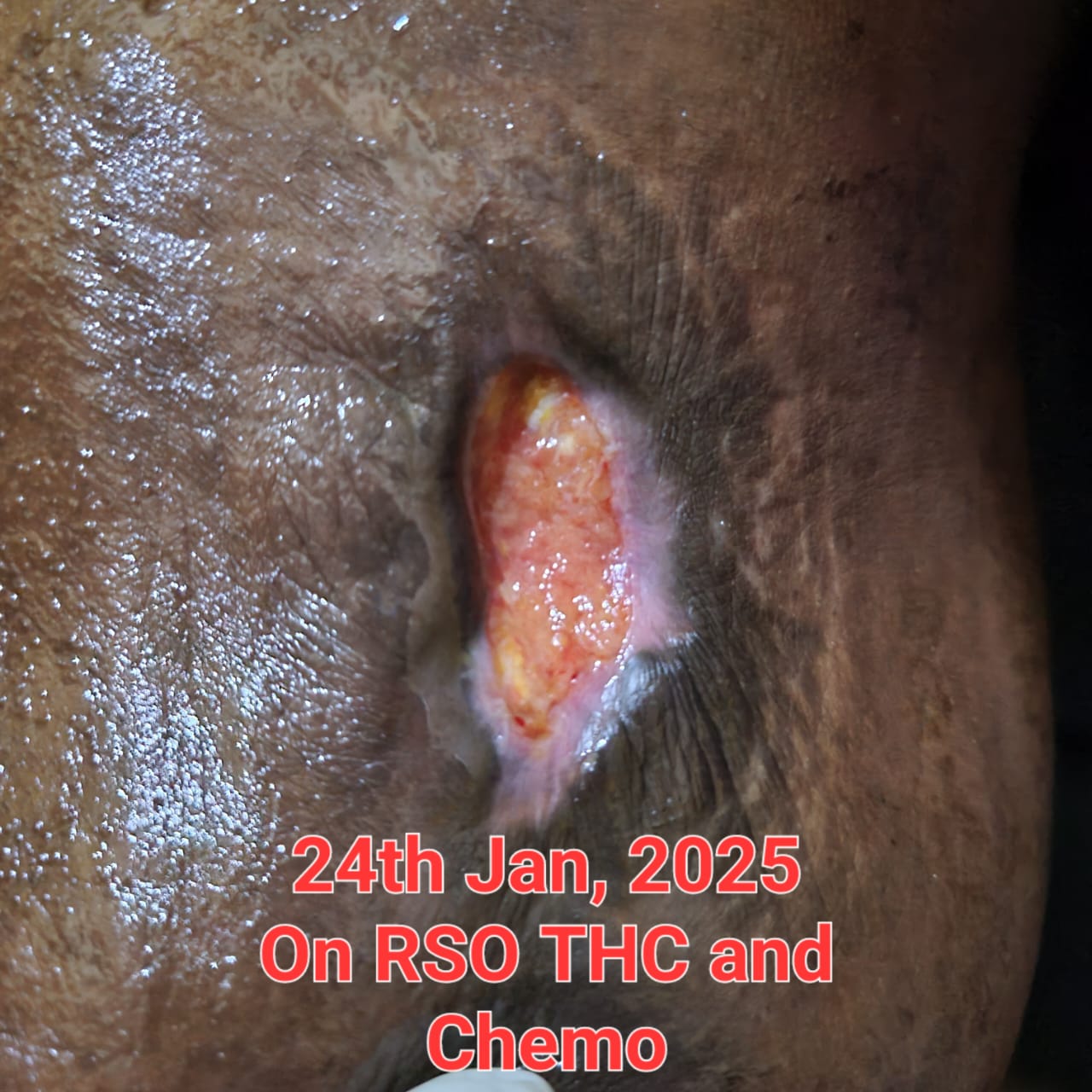
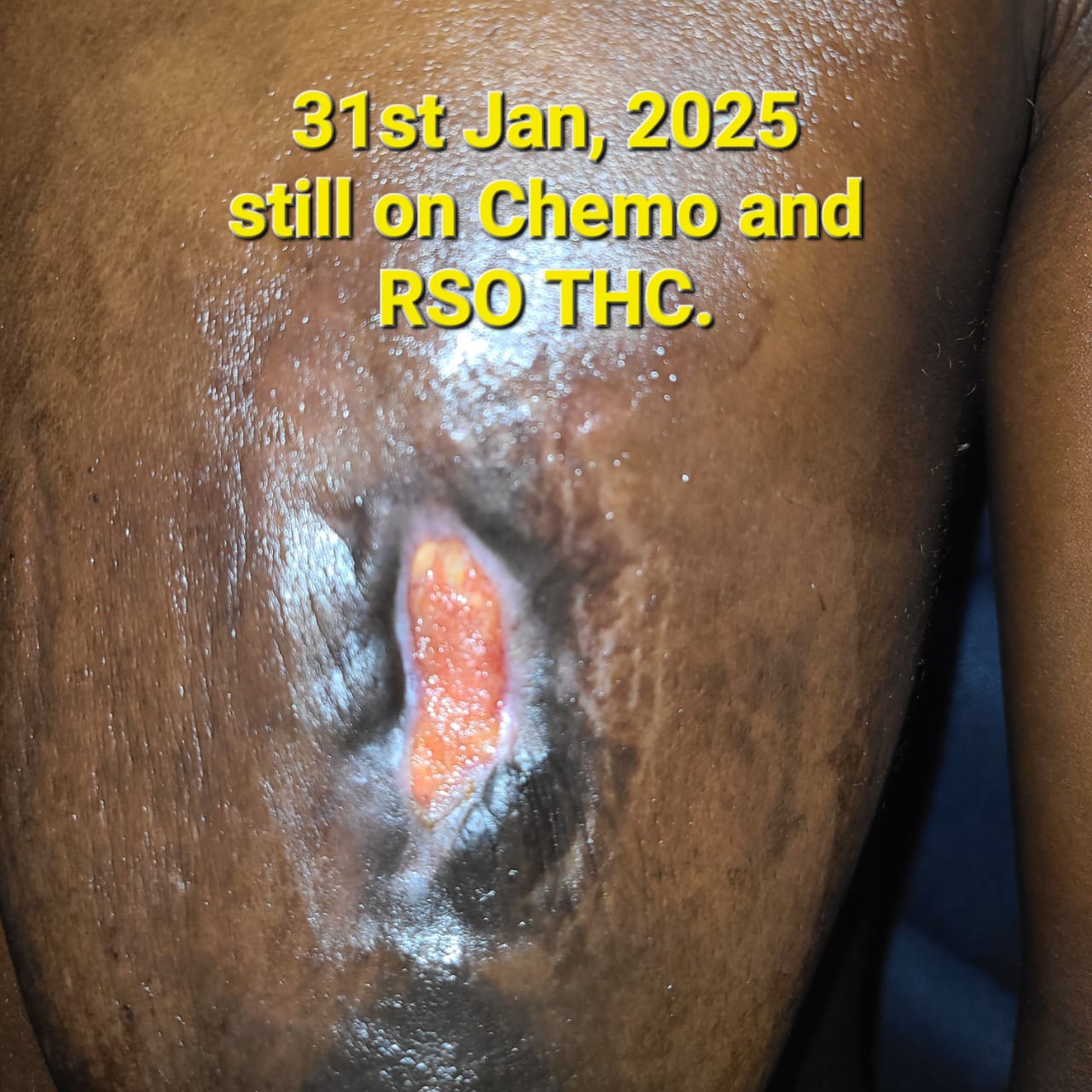
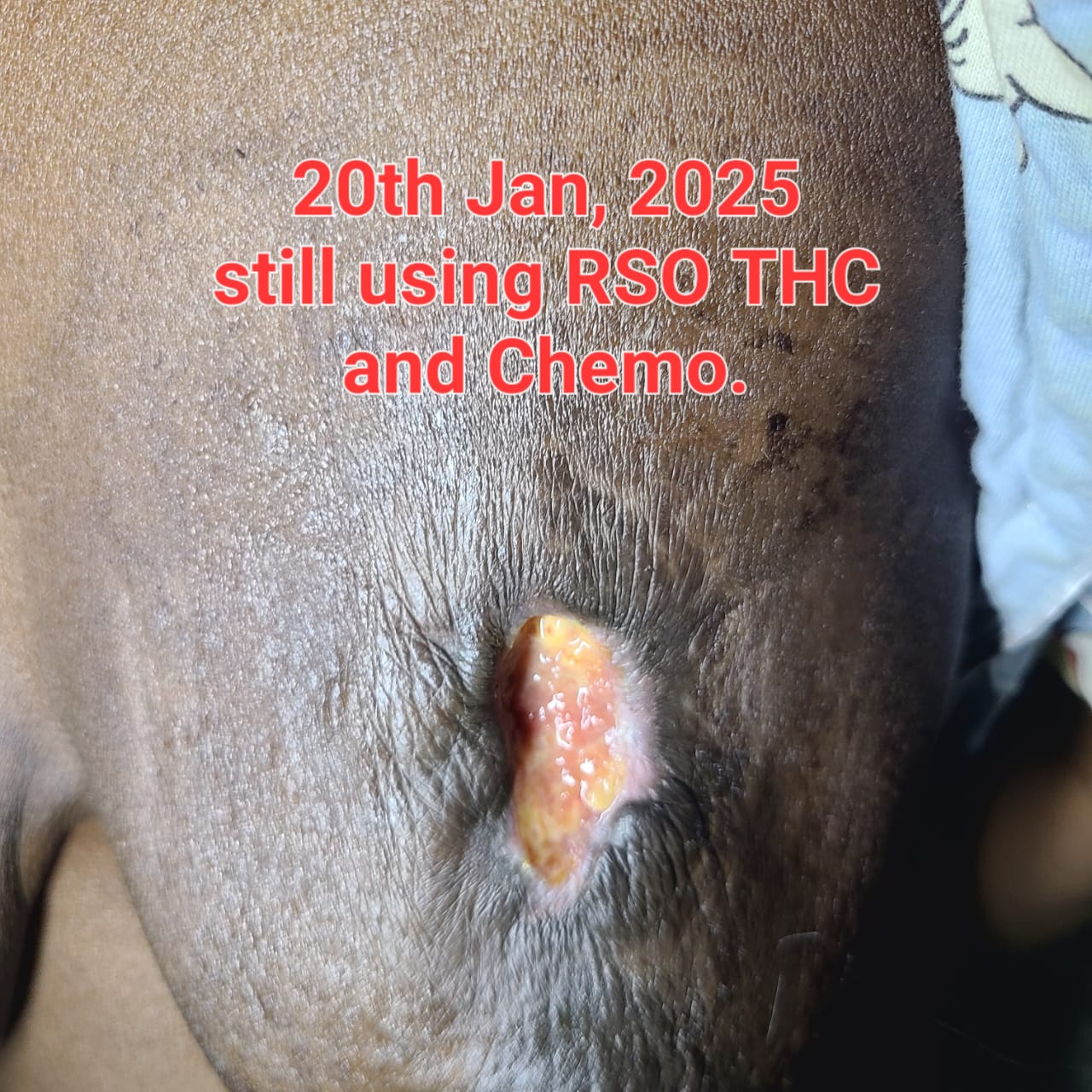

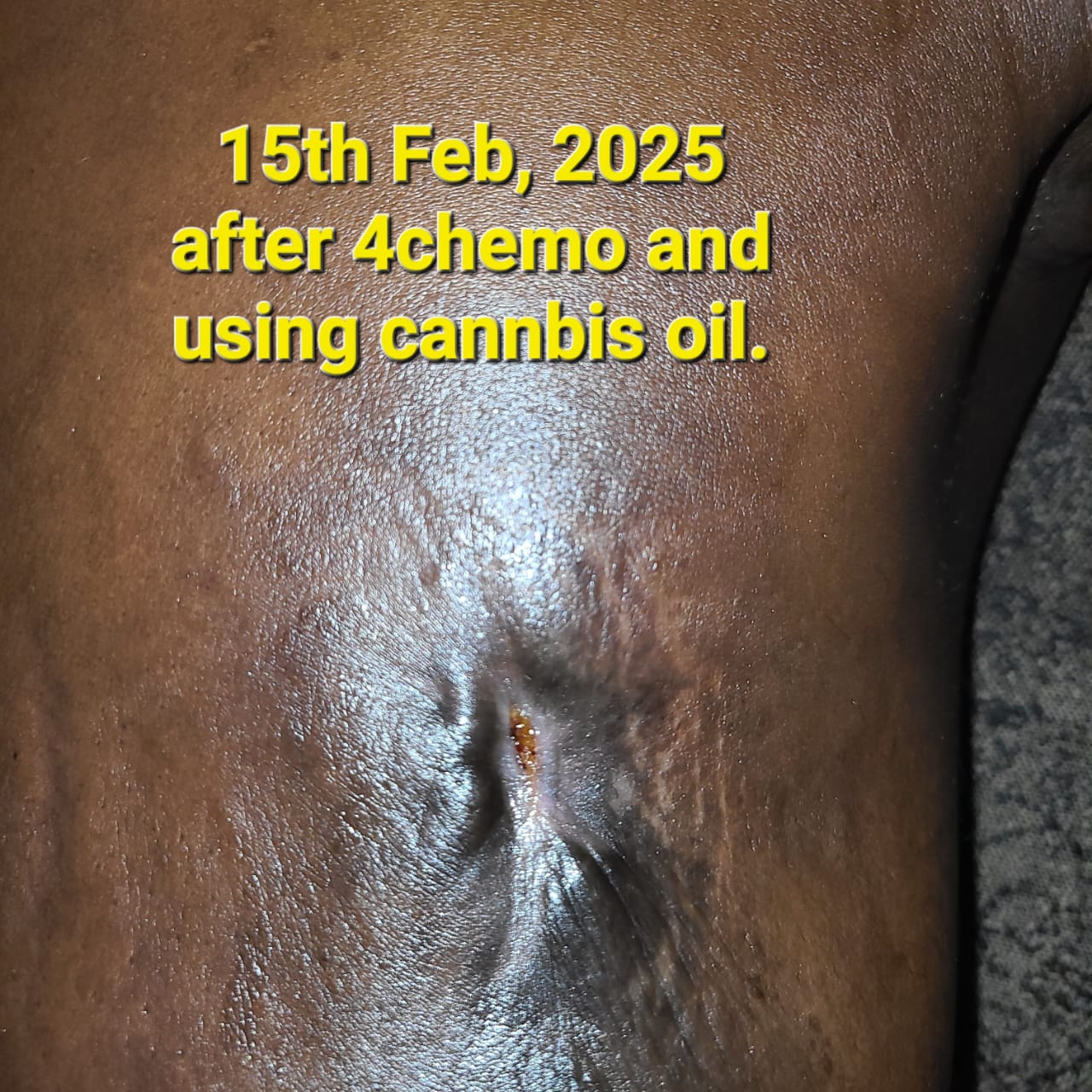
Potential Benefits of Cannabis in Breast Cancer Treatment
Cannabis has shown promise in alleviating symptoms associated with breast cancer treatment, including pain, nausea, and vomiting, by effectively managing these symptoms through its active compounds, cannabinoids. A study in the Journal of Clinical Oncology found significant pain relief in patients with chronic pain using cannabis (Ware et al., 2010).
In addition to pain management, cannabis is also beneficial for nausea and vomiting relief, particularly for patients undergoing chemotherapy. Research has shown that cannabinoids can ease chemotherapy-induced nausea and vomiting (Smith et al., 2015). According to a survey, 75% of breast cancer patients who tried cannabis reported it helpful for managing symptoms.
Furthermore, cannabis may aid in sleep improvement by easing anxiety and insomnia, as noted by Virginia Borges, director of the Breast Cancer Research Program at the University of Colorado Cancer Center. CBD, a non-psychoactive compound in cannabis, has shown potential in treating certain conditions, and its effectiveness for breast cancer treatment side effects warrants further research (Velasco et al., 2012; Hinz & Ramer, 2019).
Challenges and Limitations
While cannabis shows promise in breast cancer treatment, particularly in triple-negative breast cancer (TNBC), several challenges and limitations exist. Global cannabis regulation varies, restricting its use in cancer treatment due to legal frameworks (Moreno et al., 2021). Determining optimal dosing regimens for effective and safe treatment remains a priority.
Cannabinoids have demonstrated antitumor activity in TNBC models (Caffarel et al., 2010), but optimal dosing strategies to minimize side effects are unknown. THC's psychoactive effects can impact patients' quality of life, whereas CBD lacks these effects due to its lower CB1R and CB2R affinity (Velasco et al., 2012).
Potential interactions with conventional treatments are concerning, as cannabinoids can influence immunosuppression and immune response, impacting immunotherapy efficacy (Moreno et al., 2021). Additionally, cannabinoids affect gut microbiota, crucial for cancer immunotherapy.
Further research is necessary to fully understand cannabis's benefits and limitations in breast cancer treatment. Studies show CBD inhibits breast cancer cell growth and metastasis by modulating EGF/EGFR signaling (Ligresti et al., 2006), and the CB2R agonist JWH-015 reduces primary tumor burden and metastasis in TNBC cells (Moreno et al., 2021). These findings highlight the need for clinical trials to evaluate cannabinoids' efficacy and safety.
Conclusion
The therapeutic potential of cannabis in breast cancer treatment shows promise in managing symptoms like pain, nausea, and vomiting. Cannabinoids, such as CBD oil, THC oil, and Rick Simpson Oil (RSO), have demonstrated symptom relief and antitumor activity in preclinical studies, particularly in triple-negative breast cancer. While challenges like varying regulations, optimal dosing, and potential interactions with conventional treatments exist, further research and clinical trials are necessary to fully understand cannabis's benefits and limitations. Ultimately, cannabis may become a valuable adjunct to conventional breast cancer treatments, enhancing patient outcomes and quality of life.
References
Brassesco, M. S., Chuffa, L. G. A., & Reiter, R. J. (2011). The role of melatonin in the regulation of growth and apoptosis in cancer cells. Journal of Pineal Research, 50(2), 147–155.
Caffarel, M. M., Andradas, C., Pérez-Gómez, E., Guzmán, M., & Sánchez, C. (2010). Cannabinoids: A new hope for breast cancer therapy? Cancer Treatment Reviews, 36(3), 254–261.
Elbaz, M., Nasser, M. W., Ravi, J., Wani, N. A., Ahirwar, D. K., Zhao, H., & Ganju, R. K. (2015). Modulation of the tumor microenvironment and inhibition of EGF/EGFR pathway: Novel anti-tumor mechanisms of Cannabidiol in breast cancer. Molecular Oncology, 9(4), 906–919.
Hinz, B., & Ramer, R. (2019). Anti-tumour actions of cannabinoids. British Journal of Pharmacology, 176(10), 1389–1404.
Ligresti, A., Moriello, A. S., Starowicz, K., Matias, I., Pisanti, S., De Petrocellis, L., & Di Marzo, V. (2006). Antitumor activity of plant cannabinoids with emphasis on the effect of cannabidiol on human breast carcinoma. Journal of Pharmacology and Experimental Therapeutics, 318(3), 1375–1387.
Moreno, E., Cavanaugh, J. E., & Krivokuca, A. (2021). Cannabinoids in the treatment of triple-negative breast cancer. Cancers, 13(11), 2509.
Smith, L. A., Azariah, F., & Lavender, V. T. (2015). Cannabinoids for nausea and vomiting in adults with cancer receiving chemotherapy. Cochrane Database of Systematic Reviews, 2015(11).
Velasco, G., Sánchez, C., & Guzmán, M. (2012). Towards the use of cannabinoids as antitumour agents. Nature Reviews Cancer, 12(6), 436–444.
Ware, M. A., Wang, T., & Shapiro, S. (2010). Smoked cannabis for chronic neuropathic pain: Results of a randomized controlled trial. Canadian Medical Association Journal, 182(14), 1727–1732.
About the Author
Francis Appiah is a Doctor of Naturopathic Medicine (N.D.) candidate, medical journalist, and medical laboratory technologist, with extensive experience in healthcare administration. With over a decade in Ghana's healthcare sector, he possesses expertise in clinical diagnosis, integrative medicine, patient-centered care, analytical and diagnostic skills, problem-solving, and healthcare management. Guided by his philosophy, "Appiah, F. (2024) To get there, you must be there," he is driven to revolutionize healthcare by bridging conventional and natural medicine for balanced wellness. As the founder of Franapp Mentorship and Wellness Guidance, he empowers individuals to make informed health choices and supports medical professionals. Through Franapp House Call Medicine, he provides comprehensive medical care in patients' homes. His vision is to establish Franapp Holistic Medical Centre. He aims to bridge traditional and holistic healthcare to promote optimal wellness for all Ghanaians.
Disclaimer
The information provided in this article about the therapeutic potential of cannabis in breast cancer treatment is for educational purposes only and should not be considered medical advice. Cannabis use for medical purposes should only be done under the guidance of a qualified healthcare professional, as it may interact with other treatments or have adverse effects. Additionally, the effectiveness and safety of cannabis for breast cancer treatment are still being researched, and regulations regarding its use vary by jurisdiction. Readers should consult a qualified healthcare professional before making any decisions about using cannabis for medical purposes.
By: Francis Appiah, Doctor of Naturopathic Medicine (N.D. Candidate), Medical Journalist, & Medical Laboratory Technologist
Email: kofiappiah803@gmail.com

In Ghana, where traditional medicine complements modern healthcare, an increasing number of women are exploring alternative treatments, including cannabis, for breast cancer symptom management. Globally, breast cancer affects millions, with the American Cancer Society estimating over 280,000 new invasive breast cancer cases in the US in 2023. This disease, characterized by uncontrolled breast tissue cell growth, poses significant challenges for patients and healthcare providers. Current treatments, such as surgery, chemotherapy, radiation, and hormone therapy, often have limitations like side effects, toxicity, and resistance. Recent studies demonstrate cannabis's therapeutic potential in alleviating breast cancer treatment symptoms, sparking interest in its potential to improve patient outcomes. Examining current cannabis research and applications in breast cancer care can deepen our understanding of its role in enhancing patient quality of life.
Breast Cancer Overview
Breast cancer is a complex and multifaceted disease characterized by the uncontrolled growth of abnormal breast cells, forming tumors that can spread throughout the body if left unchecked. As one of the most common cancers affecting women worldwide, breast cancer accounted for approximately 670,000 deaths in 2022, highlighting the need for continued research and awareness. About half of all breast cancers occur in women with no specific risk factors other than sex and age.
Breast cancer can be classified into several subtypes, each with distinct characteristics. Invasive ductal carcinoma (IDC) is the most common type, starting in the milk ducts and spreading to nearby breast tissue. Lobular breast cancer begins in the milk-producing glands (lobules), while ductal carcinoma in situ (DCIS) is a non-invasive cancer confined to the milk ducts. Other aggressive subtypes include triple-negative breast cancer (TNBC) and inflammatory breast cancer (IBC).
The exact causes of breast cancer remain unknown, but several risk factors have been identified. These include being 55 or older, female gender, family history, genetic mutations (such as BRCA1, Breast cancer gene 1 and BRCA2, Breast cancer gene 2), smoking, obesity, and radiation exposure. Notably, many cases occur in individuals without known risk factors.
Symptoms of breast cancer vary, but common signs include a lump or thickening in the breast or underarm area, changes in breast shape or size, skin dimpling or redness, and abnormal nipple discharge. Early detection through regular mammograms and self-exams is crucial for effective management and treatment.
CBD Oil in Breast Cancer Treatment
Cannabidiol, CBD oil, a non-psychoactive compound found in cannabis, shows promise in breast cancer treatment by interacting with the endocannabinoid system, specifically CB1 and CB2 receptors. This interaction helps manage cancer symptoms like pain, anxiety, insomnia, nausea, and vomiting. Research demonstrates CBD's ability to modulate signal transduction pathways regulating cell proliferation, differentiation, senescence, and cell death, supporting its potential as an anticancer agent (Velasco et al., 2012; Hinz & Ramer, 2019).
Studies confirm CBD's capacity to inhibit breast cancer cell growth and induce apoptosis (programmed cell death) (Ligresti et al., 2006). CBD also counteracts some THC psychoactive effects, such as anxiety, due to its low CB receptor affinity. In triple-negative breast cancer, CBD has shown potential in preclinical studies by inhibiting tumor growth and promoting apoptosis, with its anti-inflammatory and antioxidative effects contributing to therapeutic potential (Elbaz et al., 2015).
THC Oil in Breast Cancer Treatment
Tetrahydrocannabinol (THC) oil, a primary psychoactive compound in cannabis, shows potential in breast cancer treatment. THC interacts with Cannabinoid Receptor 1 (CB1) to induce cancer cell apoptosis and inhibit the Phosphatidylinositol 3-kinase (PI3K)-Protein Kinase B (AKT) and Rat Sarcoma-Mitogen-Activated Protein Kinase (RAS-MAPK) cascades, including BCL2-Associated Death Promoter (BAD) activation. A study by Caffarel et al. (2010) demonstrated a dose-dependent reduction in breast cancer cell survival when exposed to THC.
Research highlights cannabinoids' antitumor activity in preclinical studies, particularly in Triple-Negative Breast Cancer (TNBC) (Moreno et al., 2021). The Endocannabinoid System, comprising Cannabinoid Receptors 1 and 2 (CB1R and CB2R), regulates immune responses and may enhance cancer treatment. CB1R is highly expressed in the brain, while CB2R is predominantly found in immune cells, influencing cannabinoids' suppressive effects.
Activation of CB2R has been linked to immunosuppression, inhibiting inflammatory mediators and cytokines like Tumor Necrosis Factor-alpha (TNFα) and Interleukin-1 (IL-1) (Moreno et al., 2021). This immunosuppressive effect may contribute to cannabinoids' therapeutic potential in breast cancer treatment. In TNBC, cannabinoids may modulate the tumor microenvironment, impacting tumor growth, metastasis, and treatment response, and potentially enhancing immunotherapy efficacy.
RSO in Breast Cancer Treatment
Rick Simpson Oil (RSO), a cannabis extract rich in THC, interacts with the endocannabinoid system to potentially manage breast cancer symptoms. Research by Moreno et al. (2021) shows cannabinoids exhibit antitumor activity in preclinical studies, particularly in triple-negative breast cancer (TNBC) models.
RSO's high THC content may alleviate chemotherapy-induced nausea and vomiting, as cannabinoids have been shown to reduce these symptoms in patients (Smith et al., 2015). THC also improves taste, smell, appetite, caloric intake, and quality of life for cancer patients (Brassesco et al., 2011).
The endocannabinoid system's connection to the immune system and immunosuppression suggests cannabinoid receptors could serve as biomarkers for immune checkpoint inhibitor therapy or a means to reverse immunotherapy resistance (Moreno et al., 2021).
Case Study of Ghanaian Woman's Remarkable Recovery from Breast Cancer Using RSO Cannabis Extract
A case reported by HAG News suggests that a Ghanaian woman with breast cancer experienced remarkable recovery after using RSO cannabis extract. According to Nana Kwaku Agyemang, President of the Hempire Association of Ghana and CEO of Hempire Agric Ghana Ltd, the patient had undergone chemotherapy and radiation at the Hospital. Subsequently, she was given RSO cannabis extract, originally sourced from India, by the Hempire Association of Ghana to be taken alongside her chemotherapy and radiation treatment. The patient reportedly experienced complete remission of breast cancer after a few months. I have included pictures of the patient's condition before and after treatment for visual evidence of her remarkable recovery.










Potential Benefits of Cannabis in Breast Cancer Treatment
Cannabis has shown promise in alleviating symptoms associated with breast cancer treatment, including pain, nausea, and vomiting, by effectively managing these symptoms through its active compounds, cannabinoids. A study in the Journal of Clinical Oncology found significant pain relief in patients with chronic pain using cannabis (Ware et al., 2010).
In addition to pain management, cannabis is also beneficial for nausea and vomiting relief, particularly for patients undergoing chemotherapy. Research has shown that cannabinoids can ease chemotherapy-induced nausea and vomiting (Smith et al., 2015). According to a survey, 75% of breast cancer patients who tried cannabis reported it helpful for managing symptoms.
Furthermore, cannabis may aid in sleep improvement by easing anxiety and insomnia, as noted by Virginia Borges, director of the Breast Cancer Research Program at the University of Colorado Cancer Center. CBD, a non-psychoactive compound in cannabis, has shown potential in treating certain conditions, and its effectiveness for breast cancer treatment side effects warrants further research (Velasco et al., 2012; Hinz & Ramer, 2019).
Challenges and Limitations
While cannabis shows promise in breast cancer treatment, particularly in triple-negative breast cancer (TNBC), several challenges and limitations exist. Global cannabis regulation varies, restricting its use in cancer treatment due to legal frameworks (Moreno et al., 2021). Determining optimal dosing regimens for effective and safe treatment remains a priority.
Cannabinoids have demonstrated antitumor activity in TNBC models (Caffarel et al., 2010), but optimal dosing strategies to minimize side effects are unknown. THC's psychoactive effects can impact patients' quality of life, whereas CBD lacks these effects due to its lower CB1R and CB2R affinity (Velasco et al., 2012).
Potential interactions with conventional treatments are concerning, as cannabinoids can influence immunosuppression and immune response, impacting immunotherapy efficacy (Moreno et al., 2021). Additionally, cannabinoids affect gut microbiota, crucial for cancer immunotherapy.
Further research is necessary to fully understand cannabis's benefits and limitations in breast cancer treatment. Studies show CBD inhibits breast cancer cell growth and metastasis by modulating EGF/EGFR signaling (Ligresti et al., 2006), and the CB2R agonist JWH-015 reduces primary tumor burden and metastasis in TNBC cells (Moreno et al., 2021). These findings highlight the need for clinical trials to evaluate cannabinoids' efficacy and safety.
Conclusion
The therapeutic potential of cannabis in breast cancer treatment shows promise in managing symptoms like pain, nausea, and vomiting. Cannabinoids, such as CBD oil, THC oil, and Rick Simpson Oil (RSO), have demonstrated symptom relief and antitumor activity in preclinical studies, particularly in triple-negative breast cancer. While challenges like varying regulations, optimal dosing, and potential interactions with conventional treatments exist, further research and clinical trials are necessary to fully understand cannabis's benefits and limitations. Ultimately, cannabis may become a valuable adjunct to conventional breast cancer treatments, enhancing patient outcomes and quality of life.
References
Brassesco, M. S., Chuffa, L. G. A., & Reiter, R. J. (2011). The role of melatonin in the regulation of growth and apoptosis in cancer cells. Journal of Pineal Research, 50(2), 147–155.
Caffarel, M. M., Andradas, C., Pérez-Gómez, E., Guzmán, M., & Sánchez, C. (2010). Cannabinoids: A new hope for breast cancer therapy? Cancer Treatment Reviews, 36(3), 254–261.
Elbaz, M., Nasser, M. W., Ravi, J., Wani, N. A., Ahirwar, D. K., Zhao, H., & Ganju, R. K. (2015). Modulation of the tumor microenvironment and inhibition of EGF/EGFR pathway: Novel anti-tumor mechanisms of Cannabidiol in breast cancer. Molecular Oncology, 9(4), 906–919.
Hinz, B., & Ramer, R. (2019). Anti-tumour actions of cannabinoids. British Journal of Pharmacology, 176(10), 1389–1404.
Ligresti, A., Moriello, A. S., Starowicz, K., Matias, I., Pisanti, S., De Petrocellis, L., & Di Marzo, V. (2006). Antitumor activity of plant cannabinoids with emphasis on the effect of cannabidiol on human breast carcinoma. Journal of Pharmacology and Experimental Therapeutics, 318(3), 1375–1387.
Moreno, E., Cavanaugh, J. E., & Krivokuca, A. (2021). Cannabinoids in the treatment of triple-negative breast cancer. Cancers, 13(11), 2509.
Smith, L. A., Azariah, F., & Lavender, V. T. (2015). Cannabinoids for nausea and vomiting in adults with cancer receiving chemotherapy. Cochrane Database of Systematic Reviews, 2015(11).
Velasco, G., Sánchez, C., & Guzmán, M. (2012). Towards the use of cannabinoids as antitumour agents. Nature Reviews Cancer, 12(6), 436–444.
Ware, M. A., Wang, T., & Shapiro, S. (2010). Smoked cannabis for chronic neuropathic pain: Results of a randomized controlled trial. Canadian Medical Association Journal, 182(14), 1727–1732.
About the Author
Francis Appiah is a Doctor of Naturopathic Medicine (N.D.) candidate, medical journalist, and medical laboratory technologist, with extensive experience in healthcare administration. With over a decade in Ghana's healthcare sector, he possesses expertise in clinical diagnosis, integrative medicine, patient-centered care, analytical and diagnostic skills, problem-solving, and healthcare management. Guided by his philosophy, "Appiah, F. (2024) To get there, you must be there," he is driven to revolutionize healthcare by bridging conventional and natural medicine for balanced wellness. As the founder of Franapp Mentorship and Wellness Guidance, he empowers individuals to make informed health choices and supports medical professionals. Through Franapp House Call Medicine, he provides comprehensive medical care in patients' homes. His vision is to establish Franapp Holistic Medical Centre. He aims to bridge traditional and holistic healthcare to promote optimal wellness for all Ghanaians.
Disclaimer
The information provided in this article about the therapeutic potential of cannabis in breast cancer treatment is for educational purposes only and should not be considered medical advice. Cannabis use for medical purposes should only be done under the guidance of a qualified healthcare professional, as it may interact with other treatments or have adverse effects. Additionally, the effectiveness and safety of cannabis for breast cancer treatment are still being researched, and regulations regarding its use vary by jurisdiction. Readers should consult a qualified healthcare professional before making any decisions about using cannabis for medical purposes.
Comments
Post a Comment